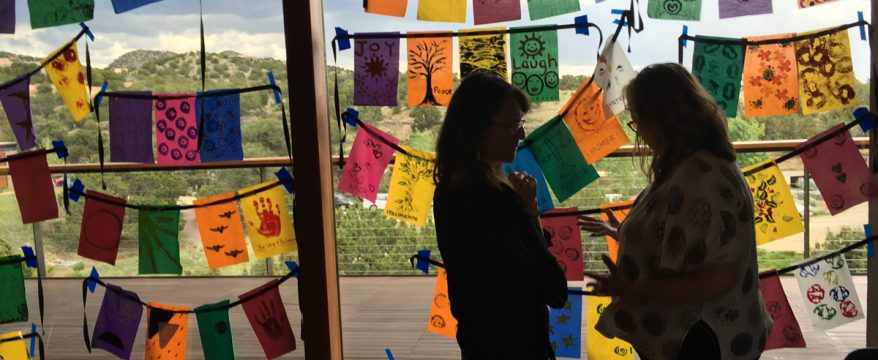Helping teachers renew—not reform
A Peek “Under the Hood” of the Institute for Teaching’s Teacher Renewal Institute
Every year around this season, as we prepare for the Academy’s annual Teacher Renewal Summer Institute, I can’t help but compare our work to other types of “professional development” for teachers. Though there are many terrific, engaging learning programs for teachers here in New Mexico (ALTO, the EE Ford Summer Teachers’ Colloquium, or the Sophia Center at the Bosque School, for example), I’d venture to guess the vast majority of workshops for teachers are conventional, “sit-and-get” lectures involving long Powerpoints and copious amounts of coffee. Ironically, many of these workshops are about how to liven up your teaching to engage your students—a classic “do-as-we-say, not-as-we-do” approach!
At the Academy, we’re all about encouraging teachers to “do-as-we-do.” My cardinal rule, when designing a workshop, is to ask myself this: “Would I want to be a participant in this workshop—given all the ways I could spend my time?” I hold myself even more religiously to that standard when helping design our summer workshop, when there are trails to be hiked, gardens to be hoed, novels to be read, and children to be enjoyed!
Bruce McPherson, former director of the North Carolina Center for the Advancement of Teaching—a pioneering organization in the field of teacher learning—explained the difference between “reforming” education and “renewing” teachers: “In my opinion, reform should focus on institutions, and renewal should be for individuals…. Reform too often assumes blame, while renewal starts with faith. Reform more than occasionally targets those who seemingly are holding back progress, while alleged recalcitrance keeps the system from working effectively. Renewal assists teachers, by encouraging them and giving them strength to continue their professional efforts. To re-form is to reshape, to change fundamentally. To re-new is to restore to original quality, to count on what already exists but may be hidden.” (1990, p.16*)
This year’s summer institute, as with all our work with teachers, stands proudly in the tradition of teacher renewal, rather than reform, or training. We take our time designing experiences that will encourage and give strength to teachers, restore their original passion for teaching and help them remember and revitalize what already exists inside them and their practice.
That’s not to say the workshops are not challenging. When I was a teacher, particularly in those first five formative years, I couldn’t wait to put the previous year behind me. I didn’t have the tools, or the patience, or the right sort of companionship that I needed to sort through the jumble of experiences, good and bad, from the school year. In many ways, it’s much easier to spend three days taking notes on the newest techniques or research than it is to dive deeply into one’s own experiences, and try to make meaning of it all.
But this year, around 30 teachers will come out to the Academy’s campus to do just that—make meaning of the previous year, and renew themselves as teachers, as learners, and as human beings. As always, we look forward to learning with them.
If you know someone in education—teacher, administrator, tutor, coach—from any school, private or public, share this post with them, and encourage them to contact me, Seth Biderman, if they’d like to learn more.
*McPherson, R.B. (1990, January). The Teacher as Student: Lessons for Leaders. Paper presented at the North Carolina ACSD Conference, Pinehurst.


